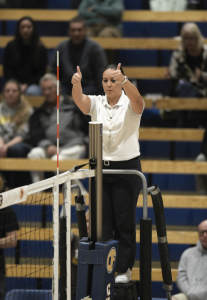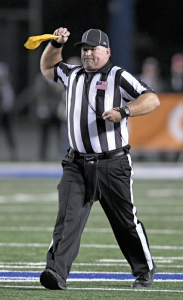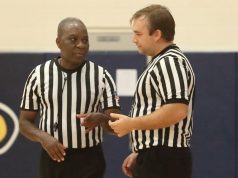Think about how many times in your career you received real-time praise from a fan, a coach or a player. Compare that with the number of times you received real-time signs of disapproval from fans, coaches or players.
After a competition, do you debrief and discuss the good stuff? After a match, what were the memorable aspects that got your attention?
What are the most salient memories of your officiating career? Do you remember the great call or no-call you made in the closing moments of a close contest when all the fans praised your decision? Or do you remember the call you made that led to booing, a report to the assigner or being blacklisted from a school?
Research suggests when individuals have been asked to recall an important, emotional event, by a ratio of 4-1, subjects recall a negative event. Have you done the same?
The tendency to focus and linger more on negative events than positive events and to weigh negative events more heavily than positive ones refers to a psychological phenomenon called the negativity bias. That bias is an evolutionary adaptation that serves to keep us safe. Attending to dangerous or harmful stimuli in our environment is what ensures our safety. If we can remember the dangers and threats in our environment, the less likely we are to repeat them. The negativity bias ensures our survival. It may protect us in a life-or-death situation or it may simply serve to protect us from blowing a call in a close contest, thus ensuring the survival of our officiating career and our reputation.
In case you’re thinking that you’re an eternal optimist who never lets the bad get to you, consider the following areas in which a negativity bias is present.
Health and Happiness – The difference between being moderately sick and very sick is relatively powerful, while the difference between being moderately well and very well has little to no impact on happiness. Health mainly affects happiness when health is bad.
Relationships – When negative behaviors outweigh positive behaviors, the relationship is more likely to fail. A ratio of 5:1 positive to negative interactions is recommended for a relationship to succeed.
Information Processing – Bad events receive more thorough processing than information about good events which leads to enhanced memory for bad material. The more we ruminate over bad memories, the more salient they become.
Reputations – Bad reputations are easy to acquire but difficult to lose, whereas good reputations are difficult to acquire, but easy to lose.
First Impressions – Negative information receives more processing and contributes more strongly than does positive information. Negative information obtained from a first impression is retained longer and is more difficult to overcome.
Feedback and Evaluations – Research shows that individuals recognize bad feedback as more powerful than good feedback. Therefore, we try to minimize the bad feedback rather than maximize the positive feedback. With workplace evaluations, supervisors tend to weigh more heavily the negative outcomes than the positive outcomes.

Online Reviews – Marketing research indicates that in online reviews, positive reviews outnumber negative reviews by a ratio of approximately 8-1, but it’s the negative reviews that have greater effect on purchase behavior.
Campaign Advertising – Approximately 80 percent of all campaign advertisements are negative. Why? Because the negative information gets our attention and forces us to process the message more deeply.
In short, bad is stronger than good because attending to the threats and dangers in our environment increase our odds of survival. So if humans are predisposed to that bias, how do we overcome it?
Since officials are constantly in challenging, evaluative situations in which praise is rare; where we’re subjected to criticism and constant review and we work in high-stress environments, we must actively work to overcome a bias toward negativity. Constantly focusing on or dwelling on the negatives can wear us down. It can make us feel like we’re not progressing. It can lead to fatigue and burnout. We’ve got to learn to overcome it. That doesn’t happen without some effort. We have to take active steps.
Adapt – When bad things happen, it usually indicates a need for change. Bad things lead to adaptation. If we adapt in the face of changing circumstances, we’re more likely to not only survive, but thrive.
One of the best methods of increasing survival is to be closely attuned to the current environment. Think about the technological changes to sport. Video, online streaming, television broadcasts, cell phone cameras — they’ve all upped the ante and put officials under increased scrutiny. That doesn’t mean that we need to officiate differently. It means that rigidity in terms of maintaining the old ways can be damaging to one’s career. Adapt and learn to embrace the changes in the game.
Find Meaning, Move On – Some evidence suggests that negatives cause people to engage in an increased search for meaning. We ask, “Why did that happen?” Consistent with the negativity bias, unpleasant events stimulate the need to find meaning to a greater degree than pleasant events. If bad feelings immediately wear off, people might repeat mistakes.
Officials do that in debriefs all the time. We examine what went wrong, why and how we could handle the situation differently. We consider alternative outcomes in the interest of fairness, impartiality and accuracy. There is value in that. It makes us better.
But once we are able to explain the play, it’s time to let it go. Ruminating on the past can affect the ability to move forward. Rehashing bad memories can create a sense of hopelessness and make it difficult to feel optimistic.
Practice “Realistic Optimism” – Tell yourself the most hopeful and empowering story possible about any given situation without denying or minimizing the facts. “Yes, I kicked that call, but I’ve never seen that happen before.” Or, “My eyes left the hitter too soon and I missed her contact. Stay with the hitter.” Learning to put your attention where it serves you best requires the same sort of deliberate practice necessary to build any new skills.
Create More Goods – If bad is stronger than good and the bads linger longer and are more powerful than the goods, then can good ever overcome bad? The answer is yes, good can overcome bad by force of numbers. Remember that at least five positives (in the form of compliments, praise, non-verbal gestures, etc.) are needed to overcome one negative attack or threat.
Make an effort to recognize and appreciate the good that you have. Celebrate small successes, be thankful, show gratitude and support others. Treat bad experiences or slipups on the court as isolated events. One slip-up does not make a bad official. Rather than reflect on the perceived shortcomings during a match, reflect on all the calls that were correct, all the decisions that maintained the flow of the match, all the calls that did not result in boos.
Reframe Feedback – The nature of sports officiating means that we often receive immediate feedback about our performance. Unfortunately, the feedback is generally negative. Fans boo. Coaches yell, argue or become demonstrable. Players express disgust. We don’t often get applauded for making good calls.
Instead of allowing the boos to capture your attention and focus your thoughts on what went wrong, consider all the plays, contacts and decisions made when the fans didn’t react. When you reframe the situation in a positive way, it makes a tremendous difference. Your accuracy rate is very high.
We can also learn to love when the fans boo. Why? Fan intensity reminds us that we’re a part of something bigger than ourselves. It shows there’s a passion for the game. Part of the fan experience is supporting one’s team. When a call doesn’t go their way, fans express it. That doesn’t mean the officials were wrong, just that an unpopular decision was made.
Our view of the world has a fundamental tendency to tilt toward the negative. Officials must work harder to see the upside.
Highlight the Positive – Think about the direction that our post-match debriefs take. We tend to discuss the controversies, problems, uncertainties and teachable moments. There is value in that and it shouldn’t be overlooked. It serves as motivation to keep learning and growing.
However, we often tend to gloss over or overlook entirely the good calls, the good positioning, the good teamwork and communication and the improvements made during a match. Include them in a fair and honest debrief. If we hear and discuss only the negative, then the negativity bias prevails.
That doesn’t pertain only to post-match debriefs. There are opportunities within a match to deliver positive feedback to crew members. An appropriately timed thumbs up, a nod or a smile in a partner’s direction does wonders to reinforce a good call, to maintain attention and to shake off a mistake. Learn how to deliver positive feedback during a match and afterward.

Build Community – Research shows that contributing to the common welfare of a community is better than thinking only of ourselves. It’s uplifting and gives us a sense of belonging. The role of community in the officiating cadre is significant. Few people outside the world of officiating can relate to what we do. We need the support of each other at all times, but especially when the stakes are high.
Show support for the officiating cadre. Take a moment to congratulate and cheer on fellow referees. Keep the dialogue on social media positive. Realize sticky situations become teachable moments that will make us all better. Show empathy when a fellow referee struggles and cheer on others’ successes because they reflect positively on each of us.
Savor the Experience – If we are predisposed to collecting and clinging to negative experiences, counteract that by intentionally developing a collection of positive memories. As we fill our memory with more positive experiences, through the act of savoring, we become less reliant on external positive stimuli around us.
Take some time after each match — in the debrief, as you travel home or while chatting with a friend — to reflect on the match. You’ve just had a shared experience together. Spend some time savoring it. That solidifies it in our memory and provides material to keep us going and enjoying the game. In your notebook, write down the good.
Good can triumph over bad by superior force of numbers. Many good events are needed to overcome the psychological effects of a single bad one.
Let’s not dwell on the one thing that didn’t go well and instead focus on the 10 things that did go well. While negativity is an inherent part of the human experience, it can be overcome with the right mind-set.
Suzanne Dodd of Greenville, S.C., works as an adjunct faculty member at Anderson University and Furman University. She holds a master’s degree in educational psychology and a doctorate in physical education, both from Florida State University. Dodd is a USAV and PAVO National Referee and a PAVO National Line Judge. She works in several NCAA Division I and II conferences. She also serves on the PAVO board of directors as camp director.
What's Your Call? Leave a Comment:
Note: This article is archival in nature. Rules, interpretations, mechanics, philosophies and other information may or may not be correct for the current year.
This article is the copyright of ©Referee Enterprises, Inc., and may not be republished in whole or in part online, in print or in any capacity without expressed written permission from Referee. The article is made available for educational use by individuals.

















